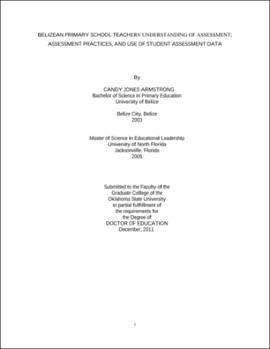| dc.contributor.advisor | Kelsey, Kathleen D. | |
| dc.contributor.author | Armstrong, Candy Jones | |
| dc.date.accessioned | 2013-11-26T08:34:07Z | |
| dc.date.available | 2013-11-26T08:34:07Z | |
| dc.date.issued | 2011-12 | |
| dc.identifier.uri | https://hdl.handle.net/11244/7294 | |
| dc.description.abstract | Scope and Method of Study: This quantitative survey study examined teachers' understanding of assessment, their practices in assessing student learning and their use of assessment data to guide their teaching. Specifically, this study sought to determine if level of training had an impact on teachers' understanding of assessment, teachers' practices in assessing student learning, or teachers' use of assessment data to guide their teaching. The overarching research focus was to find out whether teachers with more training had a greater and more positive understanding of assessment, whether they assessed their students more frequently and appropriately and whether they reported more frequent use of assessment data in guiding their teaching than those teachers with less training. | |
| dc.description.abstract | Findings and Conclusions: The results of this study showed a significant difference in understanding between teachers who had an associate's degree in primary education and teachers who had no training. Data driven decision making provided the framework to explain the teachers' assessment practices and use of student assessment data. Among the key finding of this study was that differences were not found in teachers' practices for assessing students' learning nor use of assessment data to guide teaching regardless of the teachers' level of training, gender, age or teaching experience. The mean understanding score for the entire group fell in the range of good understanding of assessment. The group with an associate's degree reported the highest mean score for all three areas (understanding, practice and use) compared with all the other groups. The highest qualified groups who had master's degrees in education or bachelor's degrees in primary education, had the highest mean scores for all three areas (understanding, practice and use) indicating that they had the least understanding of assessment, had the least positive assessment practices, and the least effective use of assessment data. | |
| dc.description.abstract | Recommendations: It is recommended that an associate's degree in primary education be the minimum requirement for entry in the teaching profession. Professional development sessions should be conducted for teaching staff to enhance their assessment skills and their knowledge of assessment, and for enhancing their assessment practices and use of data to guide their teaching. Students should be involved in the formative assessment process as their input is critical for increasing academic achievement. | |
| dc.format | application/pdf | |
| dc.language | en_US | |
| dc.rights | Copyright is held by the author who has granted the Oklahoma State University Library the non-exclusive right to share this material in its institutional repository. Contact Digital Library Services at lib-dls@okstate.edu or 405-744-9161 for the permission policy on the use, reproduction or distribution of this material. | |
| dc.title | Belizean primary school teachers' understanding of assessment; assessment practices, and use of student assessment data | |
| dc.contributor.committeeMember | Harris, Edward | |
| dc.contributor.committeeMember | Sanders, Jennifer | |
| dc.contributor.committeeMember | Mwavita, Mwarumba | |
| osu.filename | Armstrong_okstate_0664D_11709.pdf | |
| osu.accesstype | Open Access | |
| dc.type.genre | Dissertation | |
| dc.type.material | Text | |
| dc.subject.keywords | purpose of assessment | |
| dc.subject.keywords | student assessment | |
| dc.subject.keywords | teachers' assessment practices | |
| dc.subject.keywords | teachers' understanding of assessment | |
| thesis.degree.discipline | Higher Education | |
| thesis.degree.grantor | Oklahoma State University | |
